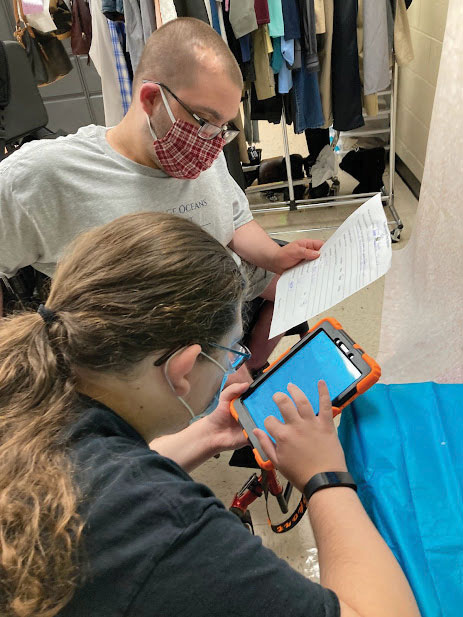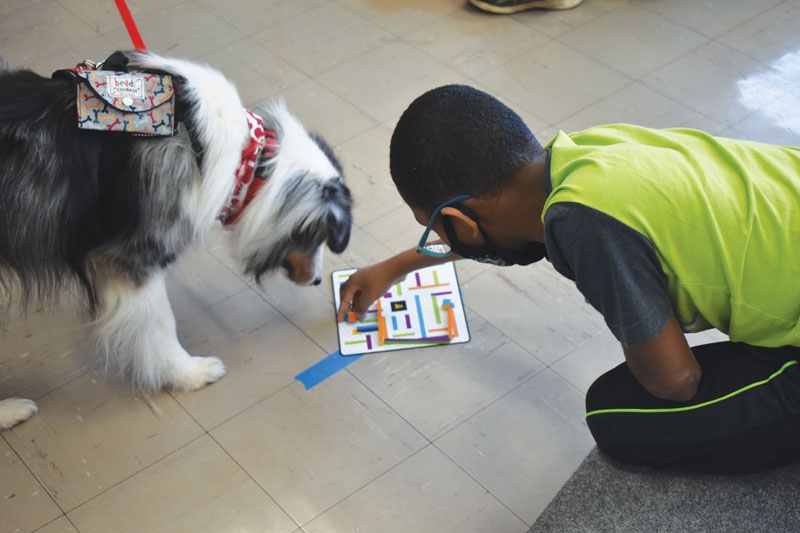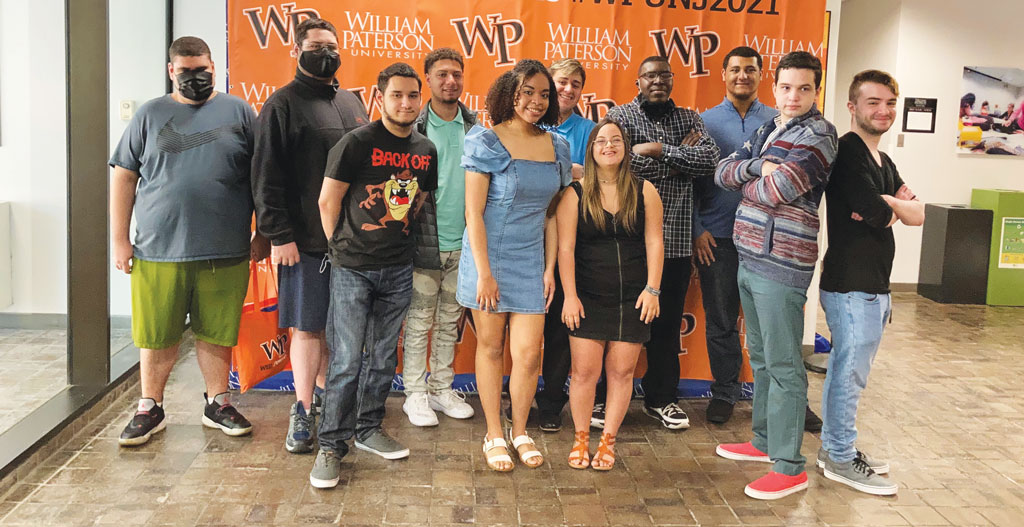Each year, the New Jersey School Boards Association, along with ASAH, an organization that serves private special education schools, conducts the Innovations in Special Education awards program to recognize imaginative and effective programs for special needs students.
This year, programs from five schools were honored: Summit High School, Transitions at Burlington County Special Services School District, New Road School of Ocean County, The Calais School and Benway School.
The winners provide a window into the creative programming that New Jersey’s special education students receive and serve as a model for other districts. Below are the details on the winning programs.

Transitions at Burlington County Special Services School District: Pioneer Posh Students aged 18 to 21 at Transitions at Burlington County Special Services School District in Westampton created a retail store experience via Pioneer Posh, an online clothing marketplace operated through the Poshmark website. Proceeds go toward supporting student activities.
Visit the site at poshmark.com/closet/pioneer_posh.
Since it was established in September 2020, the program has served about 90 students. It is funded through gently used and brand-new items donated by the community. Kelly Fletcher, a teacher, work-based learning coordinator and lead job coach, oversees the program.
“I wanted to create an on-site work opportunity that would allow for all students to participate in a way best suited for their abilities as well as to gain meaningful work skills,” Fletcher said. “With the support of administration and an amazing team of teachers and paraprofessionals, Pioneer Posh has become a fully functional retail experience for our young adults at BCSSSD.”
Principal Mary Jean Kneringer said, “The outpouring of community support to create Pioneer Posh has been overwhelming. Our original and two largest donors, Dr. Anne Marie Muldoon of Avenue Chiropractic and the BCSSSD Foundation, have both mobilized others to support the new enterprise. Donations now come from all over and at times, we have an overabundance of clothing, which we can, in turn, provide to local charities, students and families in need.”
Students have given the program rave reviews, with comments like:
- “What I like about working at Poshmark is that I’ll be given a task by my job coach to complete, and I can work on it independently.”
- “At Poshmark, I really like researching items to sell, and then writing down the description of that item for it to be posted on our Pioneer Posh site.”
- “I like that clothes are donated and we are able to sell them and use the money for our student activity fund.”
The program focuses on teaching employable skills to support growth in an online e-commerce retail environment. The students practice retail skills, such as inventory management and organizing items; digital literacy skills, such as data entry, uploading photos and navigating the web; marketing skills, such as staging items to be photographed and writing promotional copy; and laundry and life skills, including washing, folding, hanging and examining items for marks or flaws. They also handle shipping.
“It’s remarkable to see our young adults of all abilities participate in practicing purposeful skills that can be generalized to home, work and leisure environments,” Kneringer said. “These young adults show pride in their work, whether it’s completing tasks, mentoring other students to learn new tasks, or leading tours of the program.”
The most incredible growth observed from the young adults in the program is how they have developed the ability to work as a team, establishing a program from the ground up in a short period of time. Pioneer Posh receives orders from throughout the country.
So far, customers have been happy, giving the program’s portal an average rating of 4.9 out of 5 stars, with five being the highest rating. The positive ratings keep the students motivated to build on their success. A thank you note that tells buyers who they are helping when they purchase from the closet is included with each package.
Every student can participate in the program since there are so many tasks to carry out, such as sorting laundry, pretreating stains, researching costs for comparable items, posting the items on the website and then shipping the items.
The store was created amid the COVID-19 health crisis while many were prevented from shopping or reluctant to do so. Due to the program’s success, however, it will continue even with lockdowns and restrictions eased.
“I am proud of the work that Principal Mary Jean Kneringer and lead innovator and teacher Kelly Fletcher did to create and implement this unique and innovative program for our young adults on the Transitions at BCSSSD campus,” said Dr. Christopher Nagy, superintendent of schools. “The young adults who participate in Pioneer Posh are learning various work skills as well as practicing home and leisure skills, which reinforce the goals of our Transition program to promote independent living.”

Summit High School: 18–21-Year-Old Program Summit High School, part of Summit Public Schools in Union County, developed a partnership with the Summit community center that allows 18 to 21-year-olds to access a classroom and modified apartment with a full kitchen and laundry, providing them a chance to practice essential life skills. Healthy meal planning, creating a shopping list, comparing prices and shopping and cooking are built into the weekly schedule.
Students also bring their own laundry on a weekly basis and use the modified apartment to practice daily living and personal hygiene skills.
The program, which started in September 2020, has paved the way for students to get jobs at Summit Community Center as well as the Recreation Department, local Aquatic Center and Municipal Golf Course. Moreover, they’ve interacted with seniors at the community center, playing bingo and serving freshly baked cookies.
The students also created and worked on a garden throughout the year. “Planting seeds, caring for the fruits, vegetables and flowers, and harvesting proved to be a wonderful learning experience,” Doreen Babis, director of special services, wrote in her nomination letter. “We are currently planning to expand the garden to include a greenhouse and a farmstand that will be open to the community.”
On top of all this, students volunteer throughout the community. “They truly understand the meaning of giving back,” Babis wrote. “Working weekly at a Summit food bank, students help organize produce and grocery items for families in need. Additionally, the Salvation Army welcomes our students each week where they help with organizing donations, preparing items for families and other tasks.”
Babis sees the difference the program has made in the lives of students every day. “They work independently around the kitchen, know their way around the supermarket, have demonstrated success with doing their own laundry, and interact appropriately with members of our local community,” she said. Even with COVID-19, they have engaged in meaningful employment – all while making progress with functional academics, learning about banking, budgeting, completing job applications, reading a recipe, comparison shopping and more.
The opportunity to open the program has been incredibly gratifying, Babis said. “The partnership has been invaluable, and from the start has afforded our students opportunities they would not have had at Summit High School,” she said. “Being in the Summit Community Center allows our students interactions with people from all walks of life just as they would experience in their daily life. During the pandemic when most districts were still operating remotely or offering a hybrid model, our students attended school every day, all day. Clearly, this has been advantageous and has allowed for academic and social-emotional progress that many students across the state and country did not realize.”
She added that when businesses were closed and supportive learning environments were limited, if available at all, the community center provided paid employment opportunities for students. “Our students continued to thrive, learn and work, preparing them for full time employment – and that is due to the fact that they were fully immersed in academic, social-emotional and vocational programs with little interruption,” she said.
Students give the program high marks, with comments like:
- “This program has helped me to get a job and learn to be independent.”
- “I like being at the community center because it makes me feel like more of an adult.”
- “This program has helped me to be a better person and learn to do things on my own.”
The program, which is funded by Summit Public Schools, serves as an exceptional example of how a strong collaboration between public schools and the local community can have an impact on students, Babis said. She expressed her appreciation to the Summit Community Center for providing a wonderful off-campus facility at no cost to the district.
Most recently, four students were enrolled in the program, but the number varies from year to year. High school students with special needs who are too young to be part of the program also benefit from visits to the Community Center, Babis said.
Babis created the program with Nicole Allen, special education supervisor. Others in the school community are involved in the program, and the district’s transition coordinator, Child Team members and related service providers support the program.
New Road School of Ocean: Bridges to Success New Road School of Ocean County, a New Jersey approved private school for students with disabilities ages 5 to 21 who have learning, language, social, emotional and behavioral challenges, gives 18 to 21-year-olds who are part of New Road’s Pathways transitional class the opportunity to simultaneously attend Ocean Community College and New Road School through its Bridges to Success Program.
The goal is simple: to increase the likelihood that students will pursue post-secondary education, and to fully acclimate students to the college experience. Students who meet eligibility requirements enroll in one course per semester at Ocean County College during the school day.
“Now in its sixth year, eight Pathways students have gone through the program; the first student will be graduating from Kean University in 2023,” Diane O’Donnell, an administrator at the school, stated in her application letter. “While we are very proud of this program, we are most astounded by its unequivocal positive impact that it has had on New Road School’s entire academic community.”
Started in 2016, the Bridges to Success Program is part of the school’s Pathways to Independence program, which encompasses a combination of on-campus jobs, off-campus jobs and Pathways coursework that includes consumer economics, oral and written communications, computers and personal portfolio compilation, which includes creating a resume and writing down goals. The Bridges to Success Program is available to students who want to pursue a post-secondary education and is fully funded by the school.
The benefits of the program are numerous, with the Pathways teacher and a curriculum coordinator guiding students to develop time management, note-taking, organization, test-taking and communication skills. Students also receive exposure to filling out college applications, navigating a campus, completing assignments and studying for tests. “Since the establishment of the program, college attendance by New Road students has increased by 1.125 years. In addition, New Road School enrollment has increased by approximately 20%,” O’Donnell notes.
Developing the program has also allowed the school to identify learning gaps in its language and K-12 curriculum in preparing students for college. “As students have participated in our Bridges program, we have ascertained that their reading and writing skills need to improve, and we have experienced a ‘trickle down’ effect in our educational system,” O’Donnell states. “As a result, we implemented a complete and intensive overhaul of our language arts curriculum and professional development for teachers.”
The school also revamped its academic schedule to add an additional writing period and implemented a new writing program titled “The Write Source.” As a result of various changes, student writing has significantly improved as shown in data collected through online programs, writing samples and benchmark tests that show most students’ writing grade level advancing by one grade or more.
The Bridges program has directly helped more than 100 students as they progress through curricula and make their way to the 18-21 Pathways program.
“The adoption of the Bridges to Success program has united our teachers and staff as a professional learning community within an environment of respect, collaboration and collegiality,” O’Donnell notes. “It has raised parental aspirations by providing better access to higher education. The Bridges to Success program clearly has become much more than a transitional college preparatory program for our students, and we are delighted to showcase the enormous impact it has had on our student and teacher growth at New Road School of Ocean County.”

The Calais School: Animal Assisted Interventions The Calais School in Whippany in Morris County, a state-approved, private special education school serving students in grades K-12, has taken a creative approach to helping students with disabilities through its Animal Assisted interventions Program, which dates back to 2013.
Most animal interventions in a school setting focus on providing comfort to students, but the program at Calais also addresses the academic goals of each individual, according to Tiffany Shevchik, the program’s developer and coordinator.
“These interventions are visible within the school’s related services: speech and language pathology, occupational therapy, reading remediation, physical therapy and counseling,” Shevchik said. “Currently, the program is serving 56 students with 25 more students projected to join AAI services in September 2022.
Approved funding, grants and donor support allows the program to provide animal assisted therapy, animal assisted education, animal assisted activities and animal assisted crisis response services.
Dogs and their handlers are present in school five days a week and:
- Support memory skills and help expand vocabulary.
- Build positive social behaviors and self-esteem related to social skills.
- Greet and say goodbye to students during the day.
- Motivate students to participate in activities throughout the day.
- Provide security and safety for students who have been bullied.
- Help students during a time of loss, such as divorce or the death of a loved one.
Sessions can be provided to students on an individual basis, in small groups or via larger group counseling sessions. “Goals are set for all sessions, which are then documented afterward,” Shevchik said. “Over 25 points of measurement are tracked for each AAI session and collected year to year. Goals for sessions are driven by the student IEPs as well as any personal needs established by educators or counselors working with the students. At all times, during sessions, the handlers work alongside the related service providers and/or counselors to ensure efficacy, safety, professionalism and reliability.”
Even during the COVID-19 pandemic, the program pushed forward, providing virtual sessions for students. “The opportunities to provide animal assisted interventions at The Calais School are endless due to the vitality of the staff and the talent of the dogs,” Shevchik said.
Students give the program high marks, with comments such as:
- “A Calais dog is a caring dog, a loving dog, likes to hear what you feel, always there … makes me smile sometimes … makes me forget about some of the problems I have.”
- “Before I was more on edge during speech sessions. I was very tense and essentially everything negative about the speech sessions, the dogs almost entirely fixed. Even when the dogs are not here, I get memories of them, which helps just as much as if they were here. They have made an improvement, and I’d like to have them keep doing their work.”
- “In speech the dogs have helped me understand when I need a break and helped me notice when my emotions are changing. They have also helped me problem solve and say how I’m feeling.”
Likewise, professional staff members at The Calais School who conduct related service sessions during the school day often verbalize how beneficial the presence of a therapy dog can be. Mara Friedman, a speech language pathologist, said, “I love my AAI/speech sessions – the students are motivated in such a way that they enjoy doing the things that are often challenging, such as reading, answering questions, solving problems and recognizing body language and differences in verbal tone.” She added, “The dogs provide unconditional support and bring out the most positive character traits in the students as well as improve their self-esteem. The students enjoy playing games with the dogs while simultaneously learning and working on their IEP goals. I have become very interested in developing new ways to incorporate the dogs and am able to take almost any speech/language activity and modify it for AAI sessions. I am also hoping to become more involved with speaking at continuing education conferences in order to promote Calais’ AAI program.”
Members of the school’s counseling team, its occupational therapist and reading specialists have reported a higher rate of student attendance and participation during therapy sessions. More specifically, these staff members have seen improvements in students’ attitudes when learning or trying difficult tasks, enhanced cooperation in the classroom as well as during individual or group counseling sessions, and higher success rates in achieving IEP goals, Shevchik said. Additionally, the Animal Assisted Interventions program has helped to reinvigorate therapy sessions as handlers work with therapists to build sessions that incorporate the dogs in exciting ways, she said.
As Calais’ Animal Assisted Interventions coordinator and an educator, witnessing this progress firsthand is tremendously gratifying,” Shevchik said. “However, what is most gratifying is when accomplishments are verbally reported from students who are reaching milestones as a result of working with our dogs.”

The Benway School Transitions Program The Benway School Transitions Program in Wayne, in Passaic County, started in September 2018. It consists of a partnership between the New Jersey state approved private special education school for students with emotional, behavioral, and learning challenges in grades 1-12R, with William Paterson University’s “Pathway to Professional Careers,” which places transitioning students aged 18 to 21 in a college setting.
The WPUNJ Transitions program provides the ability for Benway to implement each student’s Individualized Improvement Plan goals. A share time program offers dual enrollment for students in 11th and 12th grade that provides them with marketable professional certifications and the ability to hone job exploration, time management, public speaking and goal setting skills.
“The wide variety of course offerings, collegiate setting, and the economically advantageous aspect of this program motivates students to participate in self-discovery as they set a solid foundation for their future,” Danielle Bourne, director, wrote in her application letter. “Benway provides this program to their students at no additional cost to the district, it is free for the student, and it reaches over 150 districts within their geographical region.”
As a result, students receive college-level instruction, transportation to and from the college, and additional transitional services at the same cost of their undergraduate program. “This cost-effective approach allows Benway to expand its reach to students in northern New Jersey who do not have access to such high-quality instruction and support, Bourne said.
The pre-college program’s curriculum addresses self-led transitional presentations, resume building, job coaching, selective learning experiences, community-based instruction, universal design and self-advocacy skills with the support of William Paterson University staff for IEP meetings.
Each year, the reach and success of the program grows, Bourne said. “The program has proven to be flexible as the students explore their interests,” she said. “Additionally, during the pandemic, students were still provided instruction virtually.”
As a result of the program, students have earned certifications in areas such as being a home health aide, phlebotomy, graphic design, Adobe and other areas. “Students who participate in the shared time program return to Benway in the afternoon to receive supplemental transitional services tailored to their specific needs,” Bourne said. These services include therapeutic counseling and SEL programming to aid in problem solving.
A lot of credit must go to the Transitions coordinator, Joli Simpson, who has collaborated with the university over the past five years to promote student success, Bourne said. “Her reach in helping to develop programs does not only benefit the students of Benway, but hundreds of special education students who attend William Paterson University’s pre-and post-graduate programs,” she said. “In addition, Joli has worked with the university to provide best practices so that student teachers can leave with the most impactful knowledge about working with students with disabilities with an emphasis on acceptance and use of diversification.”
Benway offers more than 150 districts in its geographic reach the opportunity to send their students to the program at no additional cost to the district. It is free for the student.
“Several of our districts currently take advantage of this excellent program,” said Elizabeth Alves, a special education teacher at Benway School. “We are proud to say that our students have been empowered to achieve their individual goals in an environment that fosters independence and supports their emotional needs to feel both safe and part of an important community.”
The Innovations in Special Education winners were recognized during a May 12 Facebook Live event hosted by the New Jersey School Boards Association. They also received a commemorative plaque to place in their school or school district building and an Innovations in Special Education Award badge to post on their respective websites.
Thomas A. Parmalee is NJSBA’s managing editor.
